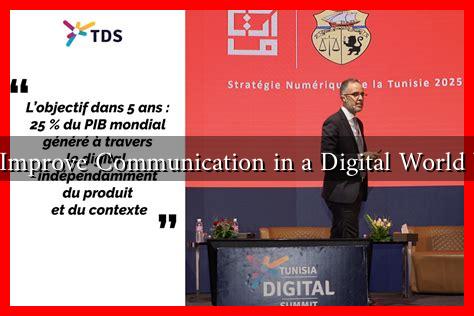-
Table of Contents
How to Improve Communication in a Digital World by 2025
As we move deeper into the digital age, effective communication has become more crucial than ever. With the rise of remote work, social media, and instant messaging, the way we interact has transformed dramatically. By 2025, the need for improved communication strategies will be paramount to ensure clarity, collaboration, and connection in both personal and professional settings. This article explores actionable strategies to enhance communication in our increasingly digital world.
The Importance of Effective Communication
Effective communication is the backbone of successful relationships, whether in business or personal life. Poor communication can lead to misunderstandings, decreased productivity, and even conflict. According to a study by the Project Management Institute, ineffective communication is a primary cause of project failure, with 56% of project managers citing it as a significant issue. Therefore, improving communication is not just beneficial; it is essential for success.
Strategies for Enhancing Digital Communication
To navigate the complexities of digital communication, consider implementing the following strategies:
- Utilize Collaborative Tools: Platforms like Slack, Microsoft Teams, and Asana facilitate real-time communication and project management. These tools help teams stay organized and connected, regardless of their physical location.
- Embrace Video Conferencing: Video calls can bridge the gap created by remote work. Tools like Zoom and Google Meet allow for face-to-face interaction, which can enhance understanding and rapport among team members.
- Establish Clear Guidelines: Create a communication policy that outlines preferred channels, response times, and etiquette. This clarity can reduce confusion and set expectations for all parties involved.
- Encourage Feedback: Foster an environment where team members feel comfortable providing and receiving feedback. Regular check-ins can help identify communication barriers and improve overall effectiveness.
- Leverage AI and Automation: Tools like chatbots can streamline communication by providing instant responses to common queries, allowing human agents to focus on more complex issues.
Case Studies: Successful Communication Strategies
Several organizations have successfully implemented innovative communication strategies that can serve as models for others:
- Buffer: This social media management platform has embraced transparency in communication. They share their internal discussions and decisions openly, fostering trust and collaboration among employees.
- GitLab: As a fully remote company, GitLab relies heavily on written communication. They have developed a comprehensive handbook that serves as a single source of truth for all employees, ensuring everyone is on the same page.
- Zapier: This automation tool company emphasizes asynchronous communication, allowing team members to work at their own pace. They utilize tools like Loom for video messages, which helps convey tone and context that might be lost in text.
The Role of Emotional Intelligence in Digital Communication
Emotional intelligence (EI) plays a significant role in effective communication. Understanding and managing emotions can lead to better interactions, especially in a digital context where non-verbal cues are often absent. Here are some ways to enhance EI in communication:
- Practice Active Listening: Focus on truly understanding the speaker’s message before responding. This can help build rapport and trust.
- Be Mindful of Tone: Written communication can easily be misinterpreted. Use clear language and consider how your message may be perceived by others.
- Show Empathy: Acknowledge the feelings and perspectives of others. This can foster a more inclusive and supportive communication environment.
Conclusion
As we approach 2025, the landscape of communication will continue to evolve. By adopting effective strategies, leveraging technology, and enhancing emotional intelligence, individuals and organizations can significantly improve their communication practices. The key takeaways include:
- Utilize collaborative tools and video conferencing to enhance connectivity.
- Establish clear communication guidelines to set expectations.
- Learn from successful case studies to implement best practices.
- Develop emotional intelligence to improve interpersonal interactions.
In a world where digital communication is ubiquitous, the ability to communicate effectively will be a defining factor for success. By prioritizing these strategies, we can foster a more connected and collaborative environment, paving the way for a brighter future.
For further reading on improving communication in the digital age, visit Forbes.

